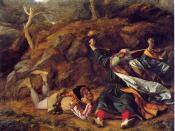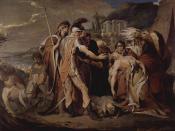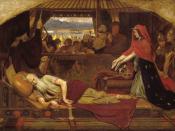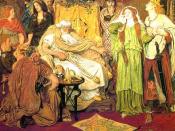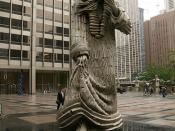English
King lear essay
In the beginning of the play, Kent is the voice of reason as well as a sort of prophet. He foresees Lear's madness, and he foresees the trouble that will come from dividing the kingdom between his two eldest daughters and banishing Cordelia. He tells Lear that Cordelia does not love him the least, and that he is being foolish and irrational. He is the only one who dares to get in Lear's face about this, saying:
Let it fall rather, though the fork invade
The region of my heart: be Kent unmannerly,
When Lear is mad. What wilt thou do, old man?
Think'st thou that duty shall have dread to speak,
When power to flattery bows? To plainness honour's bound,
When majesty stoops to folly. Reverse thy doom;
And, in thy best consideration, cheque
This hideous rashness: answer my life my judgment,
Thy youngest daughter does not love thee least;
Nor are those empty-hearted whose low sound
Reverbs no hollowness.
Lear is very easy to agitate, and definitely not used to being talked to this way. When he banishes kent in a fit of rage, he loses what could have been a very valuable councilor. Kent is perhaps his best and most loyal councilor, the only one who will do anything to help Lear, even stand up to him. Although Kent comes back, he is unable to give much council or advice, being a mere servant and henchman. He never really comes back as the same Kent. The Kent from the opening scene pretty much disappears when he is banished.
The fool is a very important character in the play. He is the only one who is able to tell Lear the brutal truth and not get banished or killed for it. Although Lear threatens him a few times in the beginning, it seems that even he knows how valuable the fool is. Lear pays attention to the fools advice and rantings, and it sometimes seems like the fool is the only character in the play who Lear seems to like and take seriously. You could even say the fool is Lear's only friend. He uses his influence to chastise Lear when he does something foolish, and give him a good dose of truth whenever he needs it.
Why, after I have cut the egg i' the middle, and eat up the meat, the two crowns of the egg. When thou clovest thy crown i' the middle, and gavest away both parts, thou borest thy ass on thy back o'er the dirt: thou hadst little wit in thy bald crown, when thou gavest thy golden one away. If I speak like myself in this, let him be whipped that first finds it so.
Any other character in the play would be severely punished for saying something like this, but the fool can get away with it, because he can tell the truth.
Cordelia is the representation of everything Lear has done wrong, and everything he regrets later in the play. She is all the things he should have paid more attention to, all the people he wronged, and all the big mistakes he made. She is the only daughter who really loves him, but he banishes her because he can't see past her lack of eloquence and her refusal to suck up to him to satisfy his whims. She tries to tell him that it is not because of a lack of affection that she wont declare her love for him, it is just because she doesn't have a quick tongue.
I yet beseech your majesty,-
If for I want that glib and oily art,
To speak and purpose not; since what I well intend,
I'll do't before I speak,-that you make known
It is no vicious blot, murder, or foulness,
No unchaste action, or dishonour'd step,
That hath deprived me of your grace and favour;
But even for want of that for which I am richer,
A still-soliciting eye, and such a tongue
As I am glad I have not, though not to have it
Hath lost me in your liking.
Kent backs her up but Lear still banishes her, and even though he regrets this later in the play, it takes her death at the end to really wake him up.
